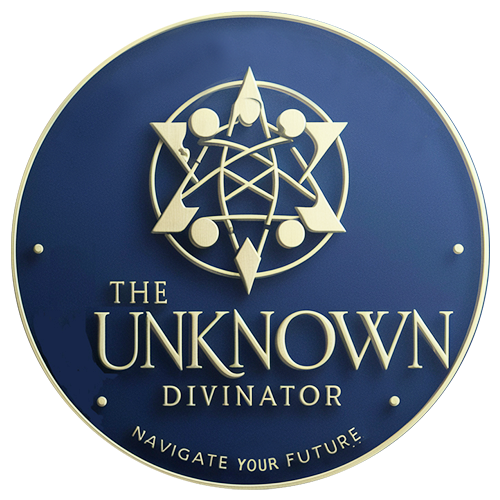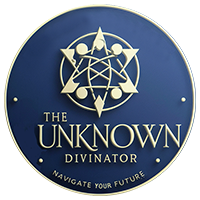What is a Divinator
A Divinator is a guide through the labyrinth of fate, a skilled navigator of the currents of destiny. They possess a unique insight, drawing from ancient wisdom, intuition, and sometimes tools like tarot cards, runes, or astrology charts. With a deep understanding of symbols and patterns, a Divinator interprets the signs of the universe to offer glimpses into what lies ahead. They are both seeker and interpreter, bridging the gap between the known and the unknown, helping seekers navigate life’s twists and turns with clarity and foresight. Whether through cards, stars, or the whispers of the wind, a Divinator illuminates the path forward, offering guidance and wisdom to those who seek it.
What is Divination
Divination is the art and practice of seeking knowledge or insight into the future or the unknown through various methods. It encompasses a wide range of techniques, from reading tarot cards and interpreting dreams to studying astrology charts and consulting oracles. Throughout history, divination has been utilized by cultures worldwide as a means of decision-making, understanding natural phenomena, and gaining spiritual guidance. While skeptics may question its validity, for many, divination offers a way to tap into intuition, symbolism, and universal energies to gain clarity and direction in life’s journey.
A Combination of Astrology, Numerology and Divination.
Combining Numerology, Astrology, and Divination offers visitors seeking insights into their future a multifaceted approach that can provide comprehensive guidance and clarity.
Numerology, with its focus on numbers and their symbolic meanings, offers insights into personality traits, life paths, and cycles. By analyzing the numbers derived from a person’s name and birthdate, numerologists can uncover patterns and tendencies that may influence future events. This provides visitors with a deeper understanding of themselves and their inherent strengths and challenges.
Astrology, on the other hand, looks to the positions and movements of celestial bodies to glean information about personality, relationships, and life events. By examining an individual’s natal chart, which is based on the time, date, and place of birth, astrologers can provide insights into future trends and potential opportunities or challenges in various areas of life.
Divination, encompassing practices like tarot card reading, rune casting, or scrying, offers intuitive guidance and symbolic interpretation. These methods tap into the subconscious mind and the collective unconscious, providing visitors with personalized insights and advice tailored to their specific questions and concerns.
By combining Numerology, Astrology, and Divination, visitors receive a holistic perspective on their future, integrating insights from multiple sources to gain a deeper understanding of themselves and the forces at play in their lives. This comprehensive approach can help them make informed decisions, navigate challenges, and seize opportunities with greater confidence and clarity.
How this combination helps
Why Divination is rare.
Divination is often considered rare because it involves tapping into realms beyond the tangible and the scientifically measurable. While practices like astrology, tarot reading, and numerology have been around for centuries and have been embraced by various cultures, they still operate outside the scope of mainstream understanding and acceptance.
One reason for its perceived rarity is the skepticism surrounding divination. In many modern societies, there is a predominant emphasis on empirical evidence and rationality, which can lead to the dismissal of practices that rely on intuition, symbolism, and mystical interpretations.
Additionally, the skills required for effective divination often involve a deep understanding of symbolism, intuition, and esoteric knowledge, which may take years of study and practice to develop. This specialized expertise can contribute to the perception of divination as a rare and elusive art form.
Furthermore, divination is often associated with spiritual or metaphysical beliefs that may not be widely embraced by everyone. This can contribute to its niche status, as those who seek out divinatory guidance may be drawn to it due to specific spiritual or philosophical beliefs.
Overall, while divination may not be commonplace in mainstream society, it continues to thrive in various cultural and spiritual traditions, serving as a valuable tool for those seeking guidance, insight, and connection to something beyond the mundane.
Summary
Divination is considered rare due to its reliance on practices outside mainstream understanding and acceptance, often involving intuition, symbolism, and mystical interpretations. Skepticism towards divination, coupled with a predominant emphasis on empirical evidence, contributes to its perceived rarity. Additionally, the specialized expertise required for effective divination, along with its association with spiritual or metaphysical beliefs, further distinguishes it as a niche practice.
Despite its rarity, divination thrives in various cultural and spiritual traditions, offering valuable guidance and insight to those who seek it. While not universally embraced, divination continues to serve as a tool for individuals seeking connection to something beyond the mundane, providing clarity and perspective on life’s uncertainties.
Why I choose a divinatory over astrologer?
You may have chosen a divinatory approach over astrology for several reasons. Divination offers a broader range of practices beyond astrology alone, encompassing methods such as tarot reading, numerology, and rune casting, which may resonate more deeply with you or your target audience. Divinatory practices often provide more personalized and intuitive guidance, allowing for a deeper exploration of individual questions and concerns. Additionally, divination can offer a more immediate and tangible connection to spiritual or mystical realms, providing a sense of empowerment and clarity in navigating life’s uncertainties. Overall, your choice of divination over astrology may stem from a desire for a more diverse and intuitive approach to understanding the future and seeking guidance.
Disadvantages of reading thru a divinator?
While divination can offer valuable insights and guidance, there are some potential disadvantages to consider. Firstly, interpretations provided by a divinator are subjective and can vary based on the practitioner’s skills, beliefs, and intuition. This subjectivity may lead to differing interpretations or conflicting advice, potentially causing confusion or uncertainty for the seeker.
Additionally, reliance on divination for decision-making may lead to a sense of dependency or passivity, as individuals may become overly reliant on external sources for guidance rather than trusting their own intuition and judgment. There’s also the risk of misinterpretation or miscommunication during a reading, which could result in inaccurate or misleading information being conveyed.
Furthermore, some individuals may experience anxiety or distress when faced with predictions or insights about their future, especially if they receive unwelcome or unsettling news. This can lead to unnecessary worry or preoccupation with potential outcomes, detracting from their ability to live in the present moment and make proactive choices.
Overall, while divination can be a helpful tool for gaining insight and clarity, it’s important to approach it with discernment and a critical mindset, recognizing its limitations and potential pitfalls. It’s also essential to balance divinatory guidance with personal reflection, intuition, and practical decision-making skills.
Why Divinators name is not given?
The absence of specific details about the divinator, such as name or photo, is a deliberate choice aimed at prioritizing the essence of the service: providing guidance and insight into the future. In divination, the focus is on the wisdom and interpretation offered rather than the individual practitioner. By omitting personal details, the emphasis remains solely on the seeker’s questions and the guidance provided, fostering a sense of universality and neutrality in the readings. After all, the true value lies in the insights gained and the clarity received, regardless of who facilitates the process. In this way, the divination experience transcends individual identities, allowing seekers to connect with the wisdom of the universe itself rather than a specific person.
It’s essential to acknowledge that while divination can offer valuable insights and guidance, absolute accuracy cannot be guaranteed. Divination operates in the realm of symbolism, intuition, and interpretation, which are inherently subjective and open to variability. Just as no two individuals are exactly alike, interpretations of divinatory messages may vary based on the practitioner’s skill, the seeker’s receptivity, and the complexity of the question.
An error in interpretation is indeed possible, but it’s essential to recognize that what may initially seem inaccurate could hold meaning or relevance in unexpected ways. The symbols and messages conveyed during a divination session may resonate differently over time or in hindsight, revealing insights that were not immediately apparent. While divination can provide valuable guidance and perspective, it’s crucial for seekers to approach it with an open mind and a willingness to engage with the messages received, understanding that the true value lies in the process of exploration and self-discovery rather than in seeking definitive answers. Therefore, while no guarantees of accuracy are offered, the potential for meaningful insights and guidance remains ever-present in the practice of divination.
Why you are merging. Astrology, numerology and divination together?
The decision to merge astrology, numerology, and divination together stems from a desire to provide seekers with a comprehensive and multifaceted approach to gaining insight and guidance. Each of these disciplines offers unique perspectives and methods for understanding the complexities of life and the universe. By integrating astrology, numerology, and divination, we tap into a broader spectrum of wisdom and symbolism, drawing from diverse sources to offer a richer and more nuanced exploration of the questions and concerns posed by seekers.
Astrology provides insights into celestial influences and cosmic energies, while numerology delves into the symbolic meanings of numbers and their significance in shaping personality and destiny. Divination, encompassing practices like tarot reading and rune casting, offers intuitive guidance and symbolic interpretation. By merging these disciplines, we create a synergy that allows for a deeper exploration of the infinite realms of existence, offering seekers a wider range of tools and perspectives to access the answers they seek. This integrative approach acknowledges the vastness of human experience and the multifaceted nature of truth, recognizing that answers may be found through various pathways of exploration within the rich tapestry of astrological, numerical, and divinatory wisdom.
Prayer vs. Effort vs. Destiny
Prayer, Effort, and Destiny often seem contradictory to each other. If you believe solely in Prayer, then Effort and Destiny might appear irrelevant. If you believe exclusively in Destiny, then Prayer and Effort might seem unnecessary. And if you rely only on Effort, then Prayer and Destiny can appear meaningless. So, what is the truth?
The truth is that all three are equally important, and none play a 100% role in our lives. There is free will, a measure of effort, prayer, and destiny. No single factor is absolute. In reality, there are hundreds of similar factors influencing our lives, many of which we may not even be aware of at this point in time.
Understanding and balancing these elements can lead to a more fulfilling life. Embracing the interplay between Prayer, Effort, and Destiny allows us to navigate life’s complexities with a more holistic approach, recognizing the contributions of each element in shaping our journey.















